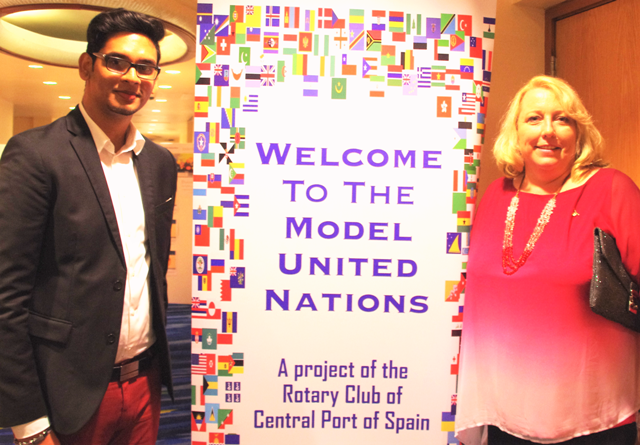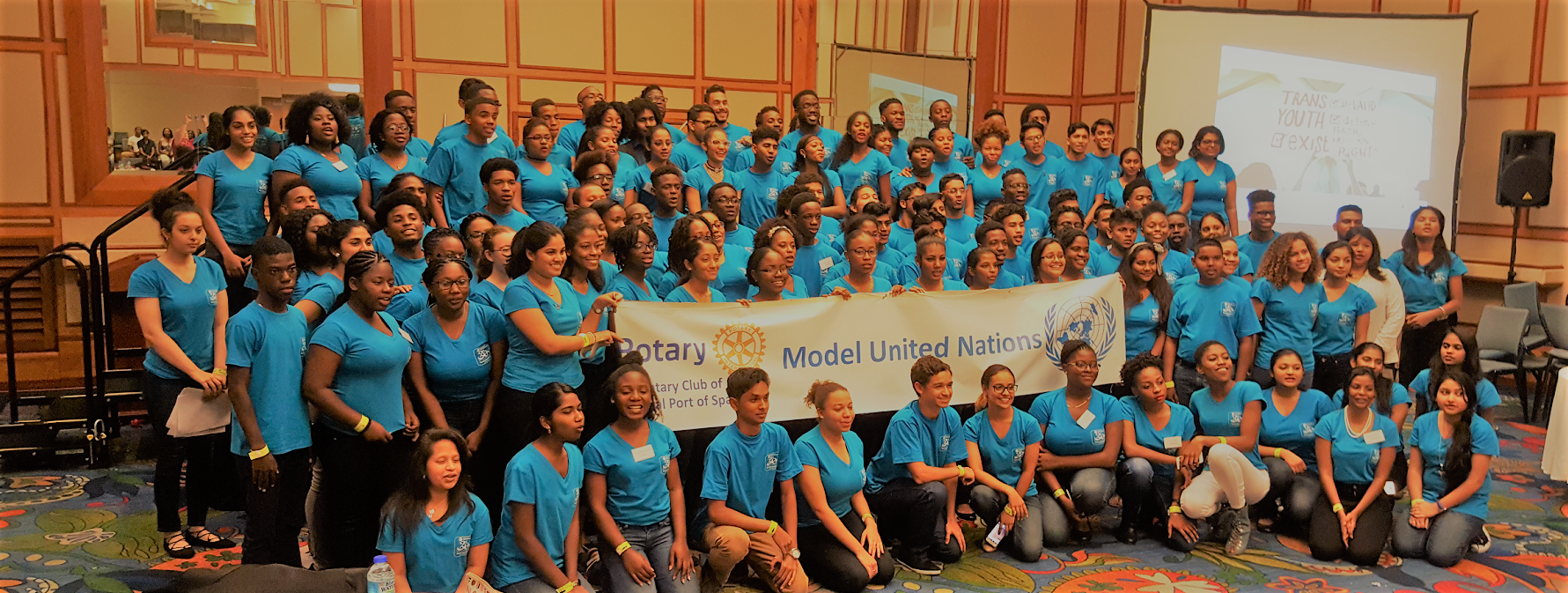Finding an Equal Place – Model United Nations 2017

One of the flagship projects of the Rotary Club of Central Port of Spain (RCCPOS) is the annual hosting of the Model United Nations (MUN). This year, the 20th installment of the MUN was held on March 18-19 2017 at the Hilton Trinidad Hotel and was attended by 120 students from Trinidad, Tobago, Suriname, St Lucia, Guyana and Barbados. The mission of the MUN is to foster a constructive forum for young people to have open dialogue on complex global issues, including international peace and security, and economic and social progress.
This year the MUN chose to discuss the human rights of Lesbian, Gay, Bisexual and Transgender persons under the theme: “Preventing discrimination against persons based on sexual orientation and gender identity”. Executive Director of The Silver Lining Foundation, Jeremy Steffan Edwards was invited to be the guest speaker at the Gala Dinner hosted by the leadership of the MUN and the RCCPOS.
The following is the text of his address:
Finding an Equal Place
Good Evening Distinguished Guests, MUN Delegates, Ladies and Gentlemen. I would like to thank the Rotary Club of Central Port of Spain, the Model United Nations project and you, the delegates, for having me here. It is indeed an honour to be with you all.
“Here every CREED and RACE finds an equal place”. These are the affirmative words of inclusion contained in our national anthem. And no, this is not my opening argument for the call to accept those of diverse sexual orientations. Quite ironically, that statement was one of many comments left under a press release we issued on Facebook, to remind me that only those of different creeds and races are welcome here in Trinidad and Tobago – the implication being that no “bullers” are allowed.
Now, if we look specifically at the etymology of the word “creed”, we will find that the word is derived from the 12th century Latin word “credo” which literally means “I believe”. This was used as a profession of faith in the Apostle’s and Nicene Creeds of the Catholic faith. In the 1580s however, the word took on a generalized sense of “ANY formula or statement of belief”, broadening its definition from religious moorings.
There are two points to take away here: the first is that my “keyboard warrior” friend needs to know that he is over 400 years late in trying to use the word to sow divisiveness and provide justification for his bigotry. Secondly, when Patrick Castagne wrote the words of what would later become our anthem in 1962, words that we hold so dear, I am certain he didn’t intend for them to be sullied in such ways that go against the very tenet that underlies the composition and that is inclusiveness.
So, what are our beliefs? What is our creed as a people and as a nation? Do we really “stand side by side”? Are we truly a nation that tolerates and accepts diversity in ALL its forms? This is the essence of what you have been debating. I am so very proud and I commend the leadership of the MUN project, for the theme of this year’s Model United Nations: “Preventing discrimination against persons based on sexual orientation and gender identity”.
This is surely not as easy a discussion as we would hope. Pejoratively referred to as “gay rights”, discussions on the human rights of those who are gay, lesbian, bisexual, transgender or intersex often erupts into emotional rhetoric, fallacious theories and an unrelenting stubbornness to see each other’s side. I know even among yourselves, delegates, you were faced with your own crises of conscience, as were some of your schools and families. In spite of that, you are here today and we salute you.
For those who are not here, it helps make the point that while some of us can choose to walk away from the discomfort of simply talking about LGBT issues, being gay is not something to which we are afforded similar luxury.
So what does it mean to be gay in this country? Well, one particular political figure stood up and said in the Parliament that gay citizens have the same rights and protections guaranteed under the law. He said: “I want to make it abundantly clear that every citizen of Trinidad and Tobago, regardless of who he or she may be, will have the protection of the written Constitution….All State agencies have a duty to protect every citizen of Trinidad and Tobago regardless of whom they sleep with.” Firstly, I want to object to the reduction of the humanity of gay citizens to just sex, but can we also really say that gay people are afforded the exact same “liberty, security, equality and protection” under the law as our heterosexual counterparts? Do LGBT-identifying or gender non-conforming kids feel safe at school? Do those adults feel safe to be out in the workplace?
Let’s explore that in some of the lives of those affected:
In May last year, a long-standing educator at Naparima College lectured the school population one morning on the biblical condemnations of homosexuality. A student named Darius would follow her and make the seemingly radical declaration to the student body that “it was okay to be gay”. This teacher would then be exposed via an audio tape, saying the vilest things about students who were gay, those she suspected of being gay and those who defended gay people. Her homophobic rant made some international headlines for her shocking comments registering her absolute disgust with the student who dared challenge her beliefs by implicitly calling for the murder of that student’s parents. She then went on to threaten to “re-arrange the faces” and “scatter the balls” of any student she perceived to be defiant of her authority and condemned other teachers and school administrators for not siding with her all the while using foul language to make her point that “perverse gay students” should not be allowed to negatively impact young impressionable students. Putting aside the palpable irony, this was allowed to happen in one of our nation’s top schools and far from being isolated, SLF continues to receive many reports from different students across the country facing similar situations.
In 2011, George Kazanjian, a young 16-year-old student attending St. Mary’s College died by suicide following his struggles with his sexuality. In relating his story, his mother spoke of George as “growing up different”. He liked the arts, theatre and performing and was a regular on locally produced television programming as a young child. As he progressed through high school however, his mother noticed him censuring himself. He stopped being interested in things that society didn’t consider masculine. His life became one of constantly trying to fit in and adhere to the toxic, unrealistic and rigid standards of masculinity that we impose on our boys, much to their detriment. Two days before he died, George approached an estranged friend and classmate, and asked him whether he knew anyone that was gay. His friend didn’t take the subject of the conversation too seriously as George seemed to be in his regular goofy manner but he told him that his sister had lots of gay friends. George then asked him what he thought about gay people to which he responded in typical teenager speak: “They’re normal. Nobody really cares”. That friend later found out that George had asked another group of boys in the school the very same question later that day. In stark contrast to his reply, George got some of the meanest, cruelest and violent words you can imagine teenage boys to utter. The power of those words were only realized and felt in the days after his death. In retrospect, George’s friend always wondered if this was his way of trying to come out to him and to seek help and support. George Kazanjian’s story gave rise to what is now The Silver Lining Foundation. George’s and Darius’ experiences of bullying, isolation and a lack of visible support have been lived by so many, including myself. Schools are supposed to be free from violence, fear and intimidation but as we can see, it doesn’t hold true for gay youths.
Then, there is Cherisse. I have been privileged to know her for over three years. Her coming out story which was shared on BuzzFeed attracted a lot of comments from other brave young women who shared similar stories using the hashtag “Life in Leggings”. Cherisse identifies as lesbian and knew of her sexuality from a very young age. While she felt safe enough to come out to certain friends, this would change on her seventeenth birthday when a male friend would corner her in a bathroom and rape her, telling her she just needed to have a man who could work the gay out of her. When her parents would later find out the reason she was raped, she would go on to lose her family, her father telling her how she absolutely ruined his life, not by being raped, but being a lesbian. Cherisse had to leave her home and her justice would never come.
There is another young woman on my radar, her name, I cannot share. What I can say as a matter of fact is that there are gay youths who are forced by their parents to leave their jobs once they’ve been outed by vindictive co-workers. There are families who will police where their children go and who they talk to in a bid to ensure that their kids aren’t continuing to be “poisoned” by the LGBT community and even go so far as to mandate their daughters or sons to marry a person of the opposite sex.
Lastly, there is Nick. I met him on the University campus. He was this tiny, soft-spoken, extremely shy guy. In talking with him, I realized that this young man had faced many unimaginable horrors at such a young age. Nick came from a broken home, he was abused, he faced many health scares and yet found it within himself to show up to every class and every exam to give it his all. During one of those health scares, he experienced a debilitating pain on the lower left of his abdomen. He was rushed to Mount Hope Hospital by his parents where he was attended to by an older doctor. Now as doctors do, he asked Nick many questions relating to his eating habits, medicines he took, sleeping patterns, exercise and even his sexual history. With respect to the latter and out of an abundance of caution, Nick advised the doctor that he did in fact engage in gay sex, should that be a probable factor in his illness. This doctor then recoiled in disgust, called in his parents, revealed to the stunned parents that their son was gay and engaging in “abominable behavior” and what they needed to do was admit him to the St. Ann’s Psychiatric Hospital where he would get treatment for this greater, “deplorable illness”. Subsequent medical examinations would show that Nick’s only health concern was that he had developed kidney stones.
These stories and the echoes of so many others which I do not have the time to mention, show the systemic failure and discrimination on all levels faced by LGBT persons. They point at institutional and legislative changes that need to be made that should not subject to the whims and fancy of a vocal few but requires the type of leadership that stands up for the dignity of all citizens and persuading others to do the same. The foundational document upon which your resolution is based, the Universal Declaration of Human Rights, proclaims a simple yet powerful idea: All human beings are born free and equal in dignity and rights. This Declaration makes clear that rights are not conferred on by governments; they are the birthright of all people. It does not matter what country we live in, who our leaders are or even who we are. Because we are human, we therefore have rights. And because we have rights, governments are bound to protect them.
Just as we have learned with differing sexes, races or disability, being LGBT does not make you less human.
Therefore, it is a violation of human rights, when people are bullied, beaten or killed because of their sexual orientation, or because they do not conform to cultural norms about how men and women should look or behave.
It is a violation of human rights when lesbian or transgender women are subjected to so-called corrective rape.
It is a violation of human rights when proper healthcare is denied to people because they are gay.
And it is also a violation of human rights when equal access to justice, the workplace and public spaces are denied to people because they are gay.
No matter what we look like, where we come from, or who we are, we are all equally entitled to our human rights and dignity. Here, every creed, race, gender and sexual orientation should be able to find an equal place and achieve their highest potential. We are not there yet but this is what we should be working towards.
As I leave you, I wish you my very best in your deliberations which conclude tomorrow. Whilst you may think that your debates may not have any binding impact, I want to tell you young leaders that your discourse has greater potential to build a new and just narrative. Your words will echo outside these walls within your circles, within your schools, within your families and your communities. Whatever discourse you put out there has the potential to change hearts, to change minds, and ultimately, to change the face of a nation. The actions you take, the ideals that you advocate, can determine whether human rights flourish where you are. Whatever principles or fundamentals you may argue over, I urge you to remember those like George Kazanjian and others gone before us and those who are still here who are fearful, hurting yet still hopeful. Remember those names, those faces and these stories, and with your help, someday, we will end up on the right side of history.
I thank you.

All the MUN Delegates following the historic passing of the resolution calling for the rights of LGBT persons to be protected.

